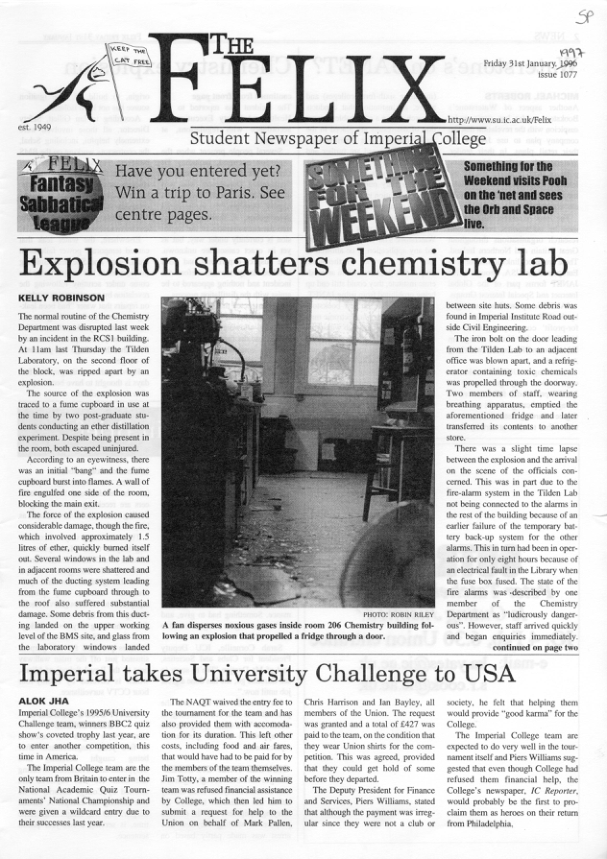School leavers opt for physics
Imperial College’s Physics department has seen an unexplained increase in the number of applicants for undergraduate degree courses. This has been reflected at a national level.
This increase has occurred despite decisions by many leading universities to axe their physics degrees. Birkbeck College, London, and East Anglia, Coventry, De Montfort, and Manchester Metropolitan Universities are all cutting back on physics courses, in accord with downward trends in the subject’s popularity over recent years. The University and College Admissions Service, UCAS, reports that the nationwide numbers of physics applicants represents an increase as high as 18% compared to last year, while Dr R Burns, IC Physics Admissions Tutor, believes the increase is in the region of 10-15% at Imperial. This increase appears to be peculiar to physics, no comparable increase having been observed in any other scientific discipline with the exception of Chemistry, which has seen a slight rise.
The state of physics in Britain’s Universities has recently been the subject of much pessimistic reporting by the media, which have made much of the cuts imposed by the aforementioned institutions. Prof B Morgan, Deputy Head of the Physics Department, pointed out that almost all those colleges axing physics are comparatively new institutions. None of them, Prof Morgan claims, are noted for their research in this field, and therefore they receive very little research funding. This reduces the cost-effectiveness of employing lecturers to teach physics. Their decisions should not, Prof Morgan believes, be considered indicative for the physics departments of institutions such as Imperial, which have an excellent reputation in this field.
Head of the Physics Department, Professor D Southwood, professed his regrets that industry in general does not recognise the importance of physics in a technically advanced market. Professor Morgan agreed that physics as a discipline is comparatively remote from industrial need, as advances in pure physics take many years before they are any use in industry, by which time they are more likely to be considered engineering.
As a result, physics research tends to receive very little support from private firms. Several years ago the government introduced the ROPA award system by which departments can claim funding from the government in proportion to the amount they have received from industry. Initially the system did not favour physicists, though this has been addressed by the efforts of many professors and the Institute of Physics.
The two main forms of Higher Education funding are teaching funding and research funding. Both types of grant come from HEFCE, the Higher Education Funding Council for England, and in both categories physics has fared badly. Teaching funding is based on student intake, which is low for physics, while research funding is based on the number of teaching staff in the department. This is also low compared to other disciplines, although IC’s physics department has not been seriously affected; HEFCE does not require that the money allocated per department be spent solely upon that particular faculty, and it is Imperial College policy to distribute funds equally between the various departments.





